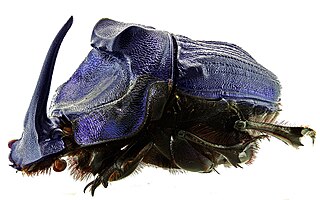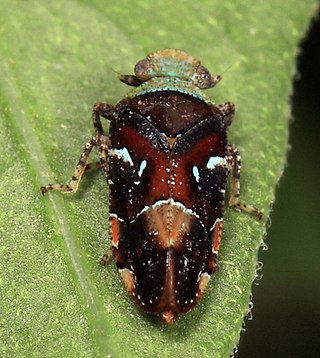
The fulgorid genus Fulgora contains several large Central and South American planthoppers known by a large variety of common names including lantern fly, peanut bug, peanut-headed lanternfly, alligator bug, machaca, and jequitiranaboia.

Chrysolopus is a genus of weevils in the family Curculionidae.

Otiorhynchus is a large genus of weevils in the family Curculionidae. Many species of the genus, particularly the black vine weevil and the strawberry root weevil, are important pests, both as larvae and as adults. Larvae feed on plant roots. Adults are flightless with fused elytra and feed at night on plant foliage. In many species of the genus at least some races are polyploid and parthenogenetic, while the rest of the races and species are diploid and bisexual. Otiorhynchus weevils, particularly O. scaber, have been a popular subject for studies of the evolution of parthenogenesis. The genus is native to the Palearctic region. However, sixteen species were inadvertently introduced to North America and have become widespread there.

Coprophanaeus is a genus in the family Scarabaeidae. The genus is almost entirely Neotropical, with a single species, C. pluto, ranging into southernmost Texas in the United States. They are medium-sized to large beetles, with the South American C. ensifer and C. lancifer sometimes exceeding 5 cm (2 in) in length, making these two some of the largest dung beetles in the world and the largest in the Americas. They often have a horn on the head, and are typically a bright metallic color, most often blue or green, or black. These diurnal or crepuscular beetles are excellent diggers and good fliers.

Xylotrechus a genus of longhorned beetles of the family Cerambycidae, containing some 200 described species.

The Aphrophoridae or spittlebugs are a family of insects belonging to the order Hemiptera. There are at least 160 genera and 990 described species in Aphrophoridae.
Cotyclytus is a genus of beetles in the family Cerambycidae, containing the following species:

Susuacanga is a genus of beetles in the family Cerambycidae, containing the following species:

Adesmus is a genus of longhorn beetles of the subfamily Lamiinae, containing the following species:

Mecinus is a genus of true weevils in the family of beetles known as Curculionidae. There are at least 90 described species in Mecinus.

Lepyrus is a genus of true weevils in the beetle family Curculionidae. There are more than 70 described species in Lepyrus.

The Tettigometridae are a family of Fulgoromorpha (planthoppers), with an Old World species distribution.

Enchenopa is a genus of treehoppers in the family Membracidae. There are more than 50 described species in Enchenopa.
Eupelicini is a tribe of leafhoppers in the subfamily Deltocephalinae. Eupelicini contains 7 genera and over 60 species divided into two subtribes: Eupelicina and Paradorydiina.
Conomelus is a genus of true bugs belonging to the family Delphacidae.
Poecilma is a genus of beetles belonging to the family Curculionidae, formerly referred to as Coryssomerus.
Gypona is a genus of leafhopper belonging to the family Cicadellidae. Gypona is the largest genus of Gyponini.











